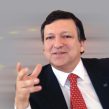
European Union’s Eastern Partnership Plan Disappoints Ukraine
Publication: Eurasia Daily Monitor Volume: 6 Issue: 64
By:

President Viktor Yushchenko was vexed when European Commission President Jose Barroso suggested that he and Ukrainian Prime Minister Yulia Tymoshenko should make peace for the sake of Ukraine’s stability. "I don’t want to get advice on what to do anywhere in Europe, this is humiliating," said Yushchenko, reacting to Barroso’s peaceful initiative at the summit of the EU’s right-of-center People’s Party, which Yushchenko and Tymoshenko attended together in March (www.glavred.info, March 19). Yushchenko’s reaction betrayed the degree of disappointment with what is widely seen in Ukraine as betrayal by the European Union of the past-Orange Revolution hopes for faster integration into the EU.
On his election as president in 2004, Yushchenko set the goals arguably too ambitious for both Ukraine and the EU to meet. The then head of his administration, Oleg Rybachuk, spoke about joining the EU within five years, and EU membership was one of Yushchenko’s main promises to his voters. As Yushchenko is approaching the end of his presidency with a personal rating of just 2-3 percent, it must be especially painful for him to realize how naïve his European dream probably was.
The economic crisis has made the EU perspective for Ukraine even more distant. The richer European neighbors are afraid that cheap labor and commodities from the east would exacerbate their problems, unemployment first and foremost. Ukraine hoped that the EU initiative for the integration of the eastern neighbors, Eastern Partnership (EP), would help Ukraine attain EU membership faster. However, the EU apparently saw EP differently from the very start. It was originally meant to complement the Northern Dimension and the Union for the Mediterranean by providing a forum for discussing visa agreements, free trade deals and strategic partnership agreements with Ukraine, Armenia, Azerbaijan, Georgia, Moldova, and Belarus. By proposing EP, the EU hoped to avoid the topic of eventual accession to the EU for the eastern neighbors.
EP was formally launched on March 20, and the declaration by the European Council – the EU’s top political body – that accompanied the event was a big blow for Ukraine, again because it expected too much. Yushchenko’s aide Andry Honcharuk bitterly criticized the "corrections" made to EP. He said that, unlike the EU’s December 3 proposal to set the goal of political association and political integration for EP members, the March 20 declaration spoke only about "creating the necessary conditions" for that. Also, unlike earlier documents, the declaration provides only for visa facilitation agreements rather than cancelling visas altogether, according to Honcharuk. Last but not least, he said, there is no mention of future EU membership in the new document (www.president.gov.ua, March 24).
Ukraine’s former Foreign Minister Borys Tarasyuk, who chairs the parliamentary committee for EU integration, noted that the EU provided for allotting only 600 million euros ($800 million) to EP for four years while the same amount was foreseen for the facilitation of Turkey’s EU integration in 2009 only. He said EP would have little practical meaning if the EU did not revise its approach (Ukrainska Pravda, March 31).
The Ukrainian Foreign Ministry expressed its concern over the EU’s proposal to introduce a more liberal visa regime instead of granting a visa-free regime to Ukraine. That proposal "does not correspond to the level of relations between Ukraine and the EU," said Vasyl Kyrylych, the ministry spokesman (Uryadovy Kuryer, March 25).
Yushchenko got more confirmation of the failure of his hopes on visas during his recent visit to the Czech Republic, which currently holds the EU rotating presidency. His secretariat head Viktor Baloha said that Yushchenko did not receive any positive signal on visas. He suggested that Ukraine should re-introduce visa requirements for the EU, which were withdrawn in the wake of the Orange Revolution in 2005. Baloha said that "profits of several million hryvnyas from the visits of European tourists cannot even partly compensate for the enormous discomfort awaiting Ukrainians travelling to Europe." According to Baloha, the number of EU visitors in Ukraine doubled since 2005 while the number of Ukrainians travelling to the EU halved (www.president.gov.ua, March 26).
The disappointment with the EU’s visa policy in Yushchenko’s camp is shared in other parties. Parliament deputy speaker Mykola Tomenko – one of the leaders of Tymoshenko’s party – asked the Foreign Ministry to re-introduce visa requirements for the EU in February due to the EU’s failure to liberalize its own visa regime (Interfax-Ukraine, February 19). The Communists demanded immediate re-introduction of visas for the EU and the US in the wake of the March 20 declaration on EP (www.proua.com, March 26).
A recent incident at the German passport control, involving heavyweight boxing champion and politician Vitaly Klichko, added insult to injury. German customs officials decided that a bag and a watch that one of the world’s richest athletes carried were too expensive and confiscated them. Klichko csalled his lawyers and reported the incident to the German press. "I can defend myself but what would a compatriot of mine who is not famous and has no connections feel in my case?" Klichko speculated in his blog (Ukrainska Pravda, March 27). Klichko happens to be a senior Kyiv city councilor and a long-time ally of Yushchenko’s.




